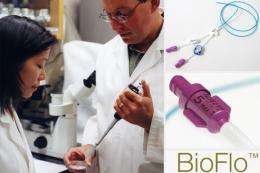Newly approved additives will be used to made surgically implanted devices safer, more successful

What began in the Dentistry lab of Professor Paul Santerre more than a decade ago is now Interface Biologics Inc. (IBI) - a privately-held company poised to transform the market for medical devices in the United States.
Through its licensing partner, AngioDynamics, IBI has just cleared a major regulatory hurdle that will allow a medical device using its polymer-based additives to be used in the United States.
"This is a transformative event for Interface Biologics and signals the beginning of what we hope will be a very successful commercialization effort," said Thomas Reeves, president and chief executive officer of IBI.
IBI's additives are used to improve devices such as ports or catheters which are implanted in the body. These additives, marketed under the name Endexo, have now been cleared by the U.S. Food and Drug Administration (FDA) for use in AngioDynamics' BioFlo PICC – a peripherally inserted central catheter - in the United States.
The body's own defense systems are primed to attack anything foreign – including devices that could help save a patient's life. The result: blood and tissue build up in or around the device, clogging blood vessels and causing worsening side effects or symptoms for patients and even requiring doctors to remove or replace the devices.
Endexo aims to change that.
Added to the device during the manufacturing process, Endexo alters the surface of the device, making it harder for blood or tissue to build up and clog the device. And, unlike coatings that are sometimes applied to medical devices to reduce blockages, Endexo does not break down quickly or alter the physical properties of the device.
AngioDynamics had already received regulatory clearance to sell its BioFlo PICC with the Endexo technology in Canada. Both clinical results and sales have been impressive, said Reeves. A recent study at a Vancouver hospital reported dramatic clinical differences between the company's PICCs and those of a competitor.
"The BioFlo PICC had a 48% reduction in occlusions – the inability to infuse or aspirate – and a 38% reduction in the need to use t-PA, which is a drug used to break up blood clots," Reeves said. "It also showed a 37% reduction in deep vein thrombosis, a very serious and life-threatening complication.
"This 'real world' data is the key behind driving commercialization of this new product so we hope to see further studies published on the clinical benefits of the BioFlo PICC with Endexo technology in the near future."
Joseph DeVivo, president and CEO of AngioDynamics, called Bioflo with Endexo technology "a truly disruptive technology" because it reduces thrombus without the use of blood-thinning drugs such as heparin, antibiotics, or antimicrobials generally associated with coatings.
Clearing this latest regulatory hurdle opens up a much larger market for the product. AngioDynamics holds an estimated 15% of the $375 million U.S. PICC market. Analysts expect the company to apply for FDA approval for additional products using the IBI technology such as BioFlo ports and BioFlo dialysis catheters.
"This technology, which started in Professor Santerre's lab at the U of T, and was spun out as a separate company in 2001, has been funded by Canadian venture capitalists (current investors are BDC, Covington, and the MaRS Investment Accelerator Fund), and has been resident at MaRS since the facility's inception," Reeves said. "By clearing this latest regulatory hurdle, IBI is on its way to being one of the great successes in the life sciences 'ecosystem' that we are all trying to engender.
"We're proud of the Canadian success story that IBI has become."

















